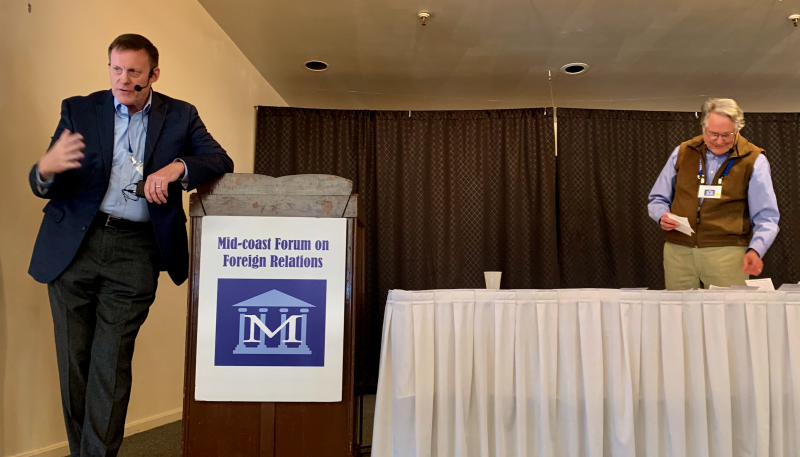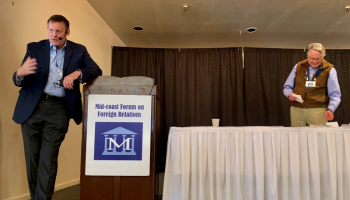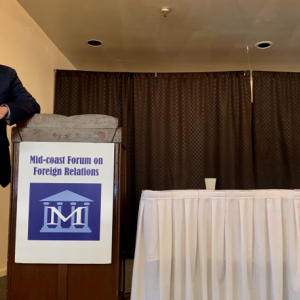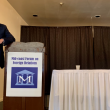Midcoast Forum on Foreign Relations speaker on current geopolitics: Uncertainty, change, and deal-making
 Retired U.S. Navy Admiral Michael Rogers and Midcoast Forum on Foreign Relations President George Look, March 10, in Rockland at the 279th meeting of the Forum. While Rogers speaks, Look organizes all of the questions that the forum attendees have submitted for Rogers to answer. (Photo by Lynda Clancy)
Retired U.S. Navy Admiral Michael Rogers and Midcoast Forum on Foreign Relations President George Look, March 10, in Rockland at the 279th meeting of the Forum. While Rogers speaks, Look organizes all of the questions that the forum attendees have submitted for Rogers to answer. (Photo by Lynda Clancy)
 Retired U.S. Navy Admiral Michael Rogers and Midcoast Forum on Foreign Relations President George Look, March 10, in Rockland at the 279th meeting of the Forum. While Rogers speaks, Look organizes all of the questions that the forum attendees have submitted for Rogers to answer. (Photo by Lynda Clancy)
Retired U.S. Navy Admiral Michael Rogers and Midcoast Forum on Foreign Relations President George Look, March 10, in Rockland at the 279th meeting of the Forum. While Rogers speaks, Look organizes all of the questions that the forum attendees have submitted for Rogers to answer. (Photo by Lynda Clancy)
ROCKLAND — The Elks Lodge in Rockland was filled with an engaged Midcoast audience March 10, as retired U.S. Admiral Michael Rogers arrived from the mid-Atlantic to talk about global geopolitics, particularly in times of significant change.
Admiral Rogers was the guest of the Midcoast Forum on Foreign Relations at its 479th meeting. Organized in 1983 by area residents, the Forum's membership has grown to 300, and convenes meet monthly or even more frequently, "to consider all aspects of foreign affairs as they impinge on our national life."
“Different and controversial views will not be avoided, but Forum analysis will be conducted in a spirit of open, free inquiry, with tolerance for differing views in the best tradition of our democratic heritage," as the Forum describes its business.
At its most recent luncheon gathering, Forum President George Look listed upcoming speakers, noting that the schedule would be doubling up in June to allow for even more speakers. Those speakers range from an International Monetary Fund economist to a United Nations ambassador and a foreign policy strategist.
"There are so many topics that need to be covered, that should be covered," said Look. "Not enough talks, too many topics."
Look introduced Four Star Admiral Rogers, who had retired from the U.S. Navy in 2018 after 37 years. He had been Commander of the U.S. Cyber Command and Director, National Security Agency. Over the course of two presidential administrations, he had advised Presidents Obama and Trump, and helped to develop policies that govern cyber intelligence and technology. His March 10 talk was the second appearance before the Forum; two years ago, he spoke about Russia and Ukraine.
This time, however, the scope broadened and he took a deep dive at a fast clip into current world tensions.
"I don't do politics," he said, at the outset. "I'm not here to argue that one party is better than the other, or one leader is better than another."
He was there, he said, as an analyst who sees both sides and lends insight to forces that shape the world, including, "how are our leaders are thinking and what does it mean for the future."
His talk focused on the actions of the current administration and the thought processes of President Trump, lending perspective on churning news from Washington, D.C.
"Clearly every one of us can realize there is lot going on," he said. "I wish I could tell you that we are in relatively static period of history with little change.... That is just not the case. You can see that domestically for us. You also see that more broadly outside the United States. This isn't a phenomenon that is unique to one country right now. I would argue that the world around us has broadly changed."
Seven years ago, he said, U.S. security interests focused primarily on the non-state actor and terrorist threats — ISIS and Al Qaeda.
"And much of our response was militarily shaped," he said.
That began to change around 2017, with increased aggression by various nations.
"I would argue that the world we are living in now is most broadly shaped by the actions of other nations and U.S. concerns about many of those other nations," he said.
He noted the larger players — China and Russia, which get a lot of publicity and attention — but the trend it is broader than that, he said.
Technology, economics and national security are underpinned, 'by this incredible information domain in which information flies broadly everywhere," with much of it inaccurate, he said, and designed to reflect a viewpoint or ideology.
Information is often designed to elicit an emotion and reaction from individuals, and the world, while more interconnected, is likewise more complicated and unpredictable. Which means solutions are more difficult and time consuming to effect. And, Rogers said, it is becoming more difficult for nations to achieve internal consensus.
Increasingly, he said, nations use technology as economic engines of the digital economy. A nation's advantage in technology shapes its ability to compete economically. National security is increasingly viewed through the prism of economic security.
"You see that playing out in a major way in the relationship between the U.S. and China," he said. "Our concerns from a national security perspective about China are largely shaped by our concerns about their economic policy and our desire to retain a technical advantage...."
At the same time, world trade has built connectivity, "not just with technology and information, but our business models," Rogers said.
Supply chains and processes have dispersed production, "and yet we can still have a high confidence that based on our knowledge, based on our ability to move product, that we can bring it all together at the time and place where we need it and we can generate enough quantities that the consumer has what they want when they want it."
COVID, however, unmasked a fragility of the interconnected economies. The question became, do some of those supply chain functions need to be moved back to the U.S., "back to friends and allies, like Mexico and Canada."
The recent tariff threats have compelled businesses to take yet another look at strategy.
"There is a whole lot of change, a whole lot of angst, and whole lot of uncertainty out there," he said.
"You take all that uncertainty, you take all that change," said Rogers. "And I would argue, throw on top of it now the United States. But it's not unique to the U.S. You see the same phenomena in changes in political leadership and political dynamics in Italy, Germany, France, the UK, the United States. And in the United States, given all this, we have an incoming administration with a very different view of what its role should be...."
Russia
"It is interesting that we have a duly elected individual [Trump] who has a fundamentally different view about what is the role of the U.S. in the broader world. What is the role of our friends and allies in the broader world? How should the dynamics between the U.S. and our friends and allies, as well as others, like Russia, that we traditionally had adversarial relationships with, how should they change?"
Trump's goal, "is to reset the relationship of the Russians." The constant confrontation between the U.S. and Russia is not in the interest of either nation, or the world.
"We were talking about Russia and Ukraine and he [Trump] said to me: 'Why is it that a nation that has among the largest hydrocarbons oil and natural gas deposits in the world, why are we focused on trying to restrict that from the global community? Why don't we want more energy made available to the world and its economies? Why wouldn't we want to drive prices down?'"
About Ukraine, Rogers recounted Trump asking: "Why is it that a nation that has the largest rare minerals deposits in the world, why would we not want to be able to access that? Why would we not want that on the market?"
Trump views himself as a change agent, said Rogers. "He is not a politician. He will sit there and tell you, 'I am a business guy, not a politician.'"
As a business guy, he is focused on outcomes. Politicians, in his view, are focused on bureaucracy and process. But Trump wants a series of outcomes that will generate better outcomes for the U.S.
"He also believes he cannot get to a better relationship with Russia while the situation with Ukraine is unfolding," said Rogers.
To get to a better relationship with Russia, the Ukraine situation has to go away, which is why he is focused on ending the war with Ukraine.
Trump also believes: "The rest of the world has lived on tens of billions of dollars that the U.S. has spent on security over the course of the last several decades. His view is that many of our friends and allies have not paid their fair share."
This leaves Europe to puzzle over its changing role.
"It is going to be a while before we know exactly what the outcome of this is," said Rogers.
Trade, tariffs and deals
The ebb and flow of tariff threats, and actual tariffs, made to China, Mexico, Canada and Europe was at force on March 10.
"It is interesting to me that he [Trump] has opted to be a little bit more aggressive with traditional friends and allies and neighbors than he has with others," said Rogers. "I think that is, in part, because he is trying to send a signal to the Chinese that he is interested, in the long run, in some sort of economic accommodation. His view is, 'hey, we can cut a deal.' I believe it is also communicating, 'I am prepared to be tough with you, but I am also interested in potentially a deal.'"
Rogers noted the difference in how the U.S. is now regarding China over the past decade. During the Biden Administration, the language was about human rights, labor practices, surveillance of Chinese citizens, fentanyl, climate change, Taiwan and the South China Sea.
Trump's language is primarily about economics.
"By focusing on a narrower subset of the dynamics between our nations, in his mind, increases the probability of the deal," he said.
"We'll see how this plays out," said Rogers. "There is a huge amount of change right now, a huge amount of uncertainty. The reality is, we do not yet know where this is going, how others are going to react, and what the impact is for us. It is going to take some period of time for these changes to play out."
Questions
As Rogers came to the end of his talk, a pile of notes had quietly been collected from the audience and delivered to the front of the room. While Rogers was talking, George Look was organizing and grouping them. Rogers glanced over to Look's table and laughed: "Wow! We've got some questions."
Look began:
"In the world view that you are talking about of the current president, is there any distinction between democracies and autocracies, or are they on equal level, and 'I'll deal with them all the same way?'"
Rogers responded: "I think broadly in his [Trump's] mind — in my opinion — I don't intend to speak for the President of the United States — his focus is much less about a particular form of government and more about the outcomes that he is trying to generate."
Another question: "Russia has been the aggressor in Ukraine and elsewhere. If we accommodate Russia, is this is going to stop?"
Rogers responded: "I'll tell you what I told him when he asked my opinion a few years ago. I said, 'Sir, the challenge, I believe, is that in order for this strategy to work, you're asking Putin to walk away from what he considers to be his core national interest. If the shoe were on the other foot, I don't think we would be walking away from what we consider to be our core national interests."
The premise of the strategy is, 'we can get to a better place and that will change Russian behavior,' but Russia's core national interests remain.
The Russians, he said, have always had "the near abroad", the belief that it does not want an enemy on its borders.
The Russian's fundamental strategy is to create a buffer space. Putin was concerned that Ukraine was going to join NATO, and become a member of the EU, to politically, militarily and economically integrate with Europe.
Israel and the Middle East
"Israel, in my opinion has clearly come to the view that it can no longer accept large, well-funded, heavily armed groups that are committed to its extinction on its borders, that it must execute following in what happened on the seventh of October, that it must execute a series of military operations to destroy those groups, their infrastructure and their weapons," said Rogers.
In March 2024, Rogers, who has spent much of his career working in Israel, again returned there.
"I went over thinking to myself, this is like 9/11 for them," he said. "This was a terrorist event on a massive scale, and they are responding, much like the United States did in the aftermath of 9/11."
But his perspective changed.
"What I found was something totally different," he said. "I found the government and its citizens did not view it as a terrorist event, but viewed it in some ways as a repeat of the Holocaust.
"That a nation that was founded for the express purpose of protecting those of the faith and ensuring that they would never again be slaughtered or victimized clearly on the basis of their faith had failed. That is not what I thought I was going to hear. And what I kept hearing was, 'never again, never again, never again. We failed in our most fundamental mission. The whole reason the state of Israel was created. We failed.'"
On reductions to U.S. government staff and programs, and its effect in international relations.
"When I travel around the world from Asia to Europe to the Middle East, much of the outside world is perplexed by what they're seeing," Rogers said.
They indicate an understanding that the Trump administration wants government to be more effective and efficient, and that excess exists: "But the execution seems to be somewhat haphazard, and all over the place. What is going on?"
Rogers responds to them: "You are seeing is a businesslike approach to the idea of significantly cutting government. I'm going, 'guys, you've read this before. Look at what Musk did in his acquisition of X. He's doing the same thing. He's just doing it in the government now....' My sense is that his [Musk's] view is, 'there is so much excess and inefficiency in the government that we can whack some level of that and the government will be able to reshape. And if we get it wrong, we just rehire them.' That is very much the commercial model. You see this all the time in the private sector."
He continued: "The challenge is the guy who spent 37 years in government is, 'OK, government is not a business.... we put checks and balances in government. We're concerned about inefficiency. We're concerned about fraud because we're not using shareholder money that a shareholder said, 'you know, I believe in this company, I believe in its risk, I'm going to invest in it.'
"Instead, we go to you, the taxpayer, and we say, 'you don't get a choice. Guess what? This is what you're going to pay the government. So you don't get the option. You don't get to buy in.'
"The first thing I always try to remind non-government people looking at government is that the model is different. It is funded by citizens who didn't get to make a choice. It's not like they got to choose an investment. They had to pay what they were directed to pay, and they don't get to choose other than through their representatives."
Reogers reiterated: "I tell people I have this discussion with, and my own family. Give it six months. This summer, when people try to go to Acadia and they can't because of the lines — 'hey, look, we had to reduce staff by a third. We're only allowing X amount of people in the park.' Or why is it that, 'my IRS refund took six months to get to me instead of the historic two or three months?'
"When the public starts seeing impact, it will be different. But at the moment, broadly, most Americans seem to say, 'OK, government probably isn't effective, let's see how it's gonna play out.'"
Reach Editorial Director Lynda Clancy at lyndaclancy@penbaypilot.com; 207-706-6657






















